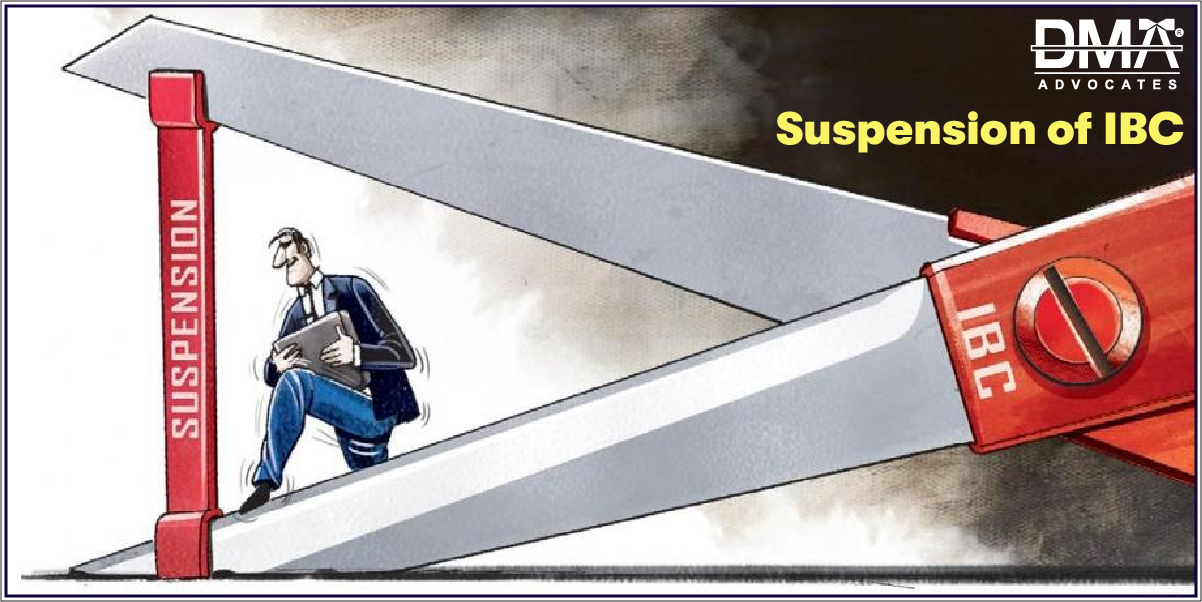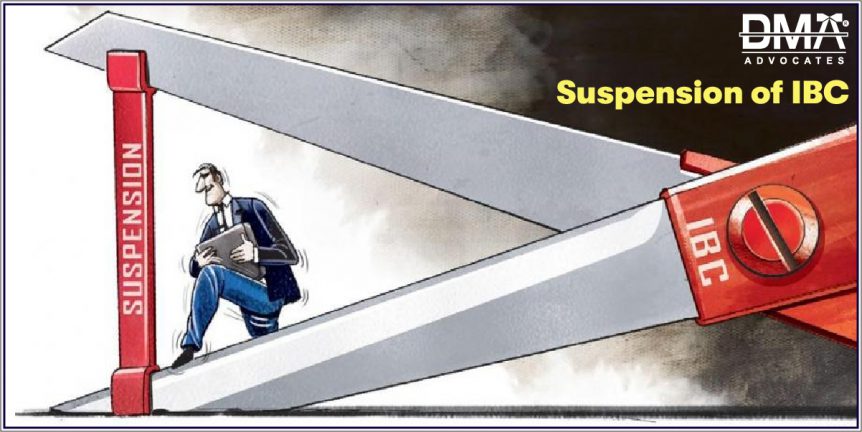
Incompatibility of the goal of forestalling expanded number of defaults by different undertakings amid monetary pain looked by the organizations because of the Corona pandemic, the Legislature of India on 22nd April 2020 proposed to present Section 10 A under the Insolvency and Bankruptcy Code, to suspend Section 7, Section 9 and Section 10 of the Code, 2016 dealing with initiation of Corporate Insolvency Resolution Process (CIRP). This suspension denotes a bar on the ability of a financial creditor, operational creditor and a corporate applicant seeking initiation of CIRP for six months, yet not surpassing a year.
Section 7 allows a financial creditor to file for initiating the corporate insolvency resolution process against a corporate debtor. Section 9 provides for the application of insolvency by an operational creditor, while Section 10 is for initiation of insolvency proceedings by a corporate applicant.
The IBC’s primary feature of a creditor in control is shaken when Section 10A is made applicable. The very establishment of the present symbol of IBC is lost, and the law needs to perceive the changed consequences flowing.
Significant Ramifications
Section 14 of the Code prevents a creditor from initiating or continuing a suit, transferring or alienating any asset by the corporate debtor and even protects from losing a property to any recovery action where it belongs to the third party. Because of this COVID-19, this pandemic acts as a protective measure that triggers only during the period whilst the resolution scheme is ongoing, the shielding rationale reflected by Section 14 of the code cannot be given protection effect under the current circumstances purely for the reason that the law nowhere explicitly mentions if the moratorium can be exercised without the filing of the CIRP under the concerned Sections 7, Section 9 & Section 10.
This carries us to the essential inquiry the suspension of starting bankruptcy activity under the IBC contributes towards unravelling the issue in the scenery of the pandemic, over the top defaults and issues for undertakings in keeping up as a going concern.
No security from other recovery laws
There is no sign that the administration will suspend the activity of the Securitization and Reconstruction of Financial Assets and Enforcement of Security Interest Act, 2002 (SARFAESI), alongside the IBC.
Additionally, the suspension of the IBC is restricted versus organizations. Just organizations that go under the referenced areas will be suspended for a year. Be that as it may, no suspension of the bankruptcy procedure against individual underwriters to an organization has been reported. This amendment only saves the companies mentioned in this section. What about the protection of small business start-ups? The suspension of IBC would not even achieve the objective of its rest, but it will indeed deprive both creditors and debtors of the benefits.
Debtor’s fundamental freedom to exit is up in the cloud.
Among created locales that have reported changes to their indebtedness laws because of COVID-19, none have suspended the capacity of borrower organizations to submit themselves to the bankruptcy procedure. In contrast, they may have limited loan bosses’ ability to start indebtedness.
Be that as it may, the suspension of Section10 of the IBC, which allows a debtor company to submit itself to the insolvency process denies the very freedom to exit, which is fundamental for efficient markets. This is especially so when the debtor in its assessment may believe that it cannot carry on its operations without orderly and timely resolution of distress.
The problem of COVID-19 obligation
It isn’t yet clear if the administration plans to proceed with the advantage of the prohibition of defaults inferable from the pandemic considerably after the suspension. On the off chance that it was along these lines, the rest of the IBC, as a result, can work past a year. Different jurisdictions have set up few limitations checking if the default or insolvency is due to of COVID-19 pandemic or not. And if it’s not, they should be given an easy escape under this suspension, i.e. some companies have not suspended their bankruptcy laws in entirety.
Inferable from the conditions around the Covid-19 lockdown, inconvenience lies with transportation offices, diminished workforce, and low income this multiply challenges for wiped out and powerless elements to keep up themselves as a going concern and draw in themselves in paying standard wages to the labourers, creating income wages from everyday exercises, and so on. One must recognize that once the time of suspension closes, a skyscraper of bankruptcies in the vast, medium and even little scope ventures will be watched. Right now, the governing body is quiet about helping theses companies after this pandemic is over.
Conclusion
This said the amendment is accomplished to serve the organizations however this seems, by all accounts, but this appears to be a short-sighted approach in dealing with issues amidst lockdown as once the expiry period is over the entire burden of the backlog will fall upon the shoulders of NCLT which is ill-equipped in terms of its institutional preparation. Henceforth the present system is opined to be ill-equipped to deal with the difficulties above and caught off guard for the surge of suits emerging post the expiry of the suspension time frame. The current component can be said to have a nearsighted methodology which is planned for diminishing the weight of new suits before the National Company Law Tribunal


